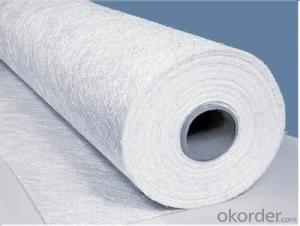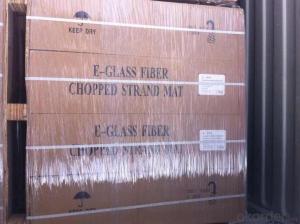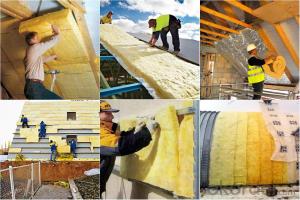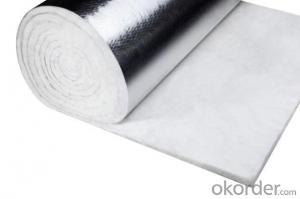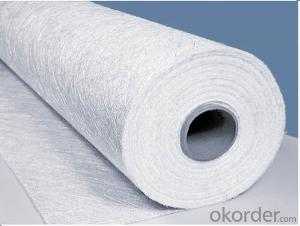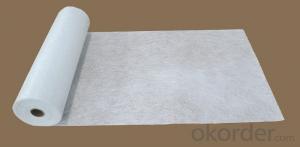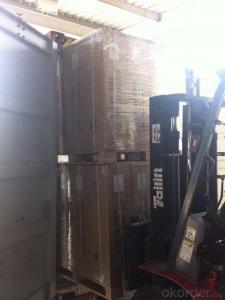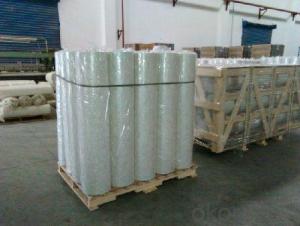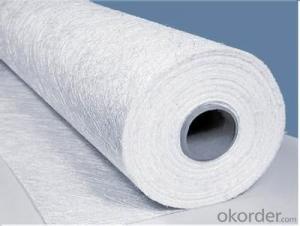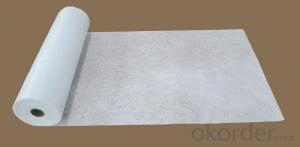Fiberglass Mat Tissue E Glass Chopped Strand Mat Powder Bonded
- Loading Port:
- China Main Port
- Payment Terms:
- TT or LC
- Min Order Qty:
- 20000 kg
- Supply Capability:
- 200000kg Per Month kg/month
OKorder Service Pledge
OKorder Financial Service
You Might Also Like
1.Brief Introduction
E-Glass Powder Chopped Strand Mat is made of randomly distributed chopped strands held together by a powder binder.
It is compatible with UP, VE, EP, PF resins.
The roll width ranges from 50mm to 3300mm.
It is designed for use in hand lay-up, filament winding, compression molding and continuous laminating processes. Its end-use applications include boats, bath equipment, automotive parts, chemical corrosion resistant pipes, tanks, cooling towers and building components
2.Product Features
Fast breakdown in styrene
High tensile strength, allowing for use in hand lay-up process to produce large-area parts
Good wet-through and fast wet-out in resins, rapid air lease
Superior acid corrosion resistance
3.Product Specifications
Property | Area Weight | Moisture Content | Size Content | Breakage Strength | Width |
(%) | (%) | (%) | (N) | (mm) | |
Property | IS03374 | ISO3344 | ISO1887 | ISO3342 | |
EMC80P | ±7.5 | ≤0.20 | 8-12 | ≥40 | 50-3300 |
EMC100P | ≥40 | ||||
EMC120P | ≥50 | ||||
EMC150P | 4-8 | ≥50 | |||
EMC180P | ≥60 | ||||
EMC200P | ≥60 | ||||
EMC225P | ≥60 | ||||
EMC300P | 3-4 | ≥90 | |||
EMC450P | ≥120 | ||||
EMC600P | ≥150 | ||||
EMC900P | ≥200 |
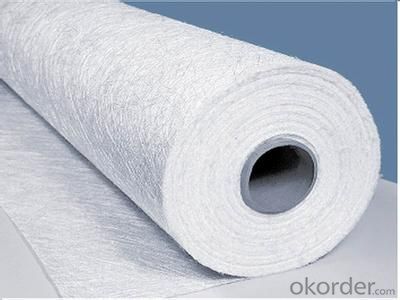
4.FAQ
Packaging:
Each Chopped Strand Mat is wound onto a paper tube which has an inside diameter of 76mm and the mat roll has a diameter of 275mm. The mat roll is wrapped up with plastic film,and then packed in a cardboard box or wrapped up with kraft paper. The rolls can be vertically or horizontally placed. For transportation, the rolls can be loaded into a cantainer directly or on pallets.
Storage:
Unless otherwise specified, Chopped Strand Mat should be stored in a dry, cool and rain-proof area. It is recommended that the room temperature and humidity should be always maintained at 15℃~35℃ and 35%~65% respectively.
- Q: Does fiberglass mat tissue require any special handling precautions?
- Yes, fiberglass mat tissue does require special handling precautions. It is important to wear appropriate protective gear such as gloves, goggles, and a respirator when working with fiberglass mat tissue to prevent skin, eye, and respiratory irritation. Additionally, it is recommended to work in a well-ventilated area to minimize exposure to fiberglass particles.
- Q: Can fiberglass mat tissue be used for composite pipe manufacturing?
- Fiberglass mat tissue is indeed applicable for the manufacturing of composite pipes. It is a reinforcement material commonly employed in the production of composite pipes. By providing strength and durability, it renders the pipes suitable for a wide range of applications. Typically, the fiberglass mat tissue is impregnated with a resin, such as polyester or epoxy, thereby facilitating the binding of the fibers to form a solid structure. This reinforcement material is renowned for its lightweight properties and exceptional resistance to corrosion, making it a highly desirable option for composite pipe manufacturing. Moreover, it can easily be molded into various shapes and sizes, allowing for the production of pipes with different diameters and lengths. As a whole, the utilization of fiberglass mat tissue in composite pipe manufacturing brings about numerous benefits, including increased strength, durability, and resistance to severe environmental conditions.
- Q: Can fiberglass mat tissue be used for aerospace applications?
- Yes, fiberglass mat tissue can be used for aerospace applications. It is commonly used as a reinforcing material in the aerospace industry due to its excellent mechanical properties, such as high strength-to-weight ratio and resistance to corrosion. Additionally, fiberglass mat tissue can provide thermal insulation and fire resistance, making it suitable for various aerospace components, including aircraft interiors, panels, and structural parts.
- Q: How does fiberglass mat tissue compare to other types of insulation materials?
- Fiberglass mat tissue stands out as an insulation material with distinct characteristics and benefits when compared to other options. To begin with, its thermal insulation properties are remarkable. With its low thermal conductivity, it effectively minimizes heat transfer between the inside and outside of buildings. As a result, it helps maintain cooler temperatures in summer and warmer temperatures in winter, leading to energy savings and enhanced comfort. Moreover, fiberglass mat tissue excels in sound insulation. It effectively reduces noise transmission through walls and floors, creating a calm and peaceful indoor environment. This is particularly advantageous in commercial buildings, where noise reduction plays a vital role in productivity and customer satisfaction. Notably, fiberglass mat tissue is lightweight and flexible, making it easy to handle and install. It can be easily tailored to fit around obstacles such as pipes and ducts, ensuring a tight and efficient insulation barrier. This simplifies installation, saving time and labor costs during construction or renovation projects. Another significant advantage of fiberglass mat tissue is its fire resistance. As a non-combustible material, it does not contribute to the spread of fire. This is especially crucial in buildings prioritizing fire safety, such as hospitals, schools, and residential properties. Furthermore, fiberglass mat tissue is durable and long-lasting. It does not degrade or lose its insulation properties over time, guaranteeing consistent energy efficiency and performance for many years. This durability makes it a cost-effective choice, reducing the need for frequent replacement or maintenance. Lastly, fiberglass mat tissue is environmentally friendly. It is manufactured using recycled glass and sand, decreasing the demand for raw materials. Additionally, it is recyclable at the end of its lifespan, reducing waste and promoting sustainability. In conclusion, fiberglass mat tissue offers exceptional thermal and sound insulation, effortless installation, fire resistance, durability, and environmental benefits. While other insulation materials may present their own advantages, fiberglass mat tissue remains a versatile and reliable option for diverse applications.
- Q: How does fiberglass mat tissue compare to polyurethane insulation?
- In the construction industry, fiberglass mat tissue and polyurethane insulation are commonly used materials, but they differ in terms of their composition, performance, and applications. Fiberglass mat tissue consists of woven glass fibers and is primarily used to reinforce various materials, including roofing, wall insulation, and fiberglass composites. Its main advantage lies in its high tensile strength, which provides excellent structural support and durability. Additionally, it is resistant to fire and chemicals, making it a suitable option for applications where safety is a concern. In contrast, polyurethane insulation is a foam material known for its exceptional thermal insulation properties. It is frequently utilized in buildings to minimize heat transfer and enhance energy efficiency. With its high R-value, indicating its ability to resist heat flow, it is particularly well-suited for insulation purposes, especially in regions with extreme temperature conditions. Furthermore, polyurethane insulation is lightweight, easy to install, and exhibits good moisture resistance. When comparing fiberglass mat tissue to polyurethane insulation, it is crucial to consider the specific requirements of the project. Fiberglass mat tissue is best suited for applications that necessitate structural reinforcement, such as roofing and composite materials. Its strength and durability make it the preferred choice for such applications. On the other hand, polyurethane insulation excels in terms of thermal insulation. It offers superior heat resistance and possesses a higher R-value compared to fiberglass mat tissue. Therefore, if the primary objective is to enhance energy efficiency and minimize heat transfer, polyurethane insulation would be the superior option. In conclusion, fiberglass mat tissue and polyurethane insulation each have their own advantages and disadvantages. The decision regarding which material to use should be based on the specific needs of the project, whether it be structural support or thermal insulation requirements. Consulting with a professional and taking into account factors such as budget, environmental impact, and local building codes will aid in making an informed decision.
- Q: Can fiberglass mat tissue be used for making lightweight furniture?
- Yes, fiberglass mat tissue can be used for making lightweight furniture. Fiberglass mat tissue is a thin, lightweight material made from glass fibers that are bonded together with a resin. It is commonly used in various industries, including automotive, aerospace, and construction, for its excellent strength-to-weight ratio. When used in furniture manufacturing, fiberglass mat tissue can be layered and molded into different shapes and forms, providing structural support and rigidity while keeping the overall weight of the furniture low. This makes it an ideal choice for creating lightweight furniture pieces that are easy to move around and transport. Additionally, fiberglass mat tissue is highly durable and resistant to moisture, chemicals, and heat, making it suitable for both indoor and outdoor furniture applications. Its versatility allows furniture designers and manufacturers to create unique and innovative designs while maintaining the desired lightweight characteristics. However, it is important to note that the final product's quality and performance will also depend on the overall design, construction, and other materials used in combination with the fiberglass mat tissue. Therefore, proper engineering and manufacturing techniques should be employed to ensure the furniture's longevity, stability, and safety.
- Q: How is fiberglass mat tissue different from fiberglass cloth?
- Fiberglass mat tissue and fiberglass cloth, despite being woven glass fiber materials, exhibit distinct dissimilarities. Fiberglass mat tissue, an unwoven substance, comprises glass fibers randomly arranged and held together by a binding agent. It predominantly serves as a reinforcement layer in composite materials like fiberglass reinforced plastic (FRP) and fiberglass reinforced concrete (FRC). The random fiber orientation enhances the composite structure's robustness and stability. Notably, fiberglass mat tissue finds widespread usage in applications necessitating strength and rigidity, such as boat hulls or automotive components. In contrast, fiberglass cloth, a woven material, is created by interlacing glass fibers in a specific pattern. It is commonly employed in situations where flexibility and conformability are essential, such as the construction of surfboards or within the aerospace industry. By allowing precise and controlled fiber placement, fiberglass cloth facilitates the production of intricate shapes and attains a superior level of detail in the final product. Ultimately, the primary disparity between fiberglass mat tissue and fiberglass cloth lies in their structural characteristics and intended applications. While fiberglass mat tissue offers strength and stability, fiberglass cloth provides flexibility and conformability. The selection between these materials hinges on the project's specific requirements and the desired outcome.
- Q: Is the Teflon gasket filled with fiberglass or graphite?
- PTFE itself has the effect of self lubrication, you can ask the production of PTFE can add these, should not be able to! Vespel can add graphite to increase self lubrication
- Q: Is fiberglass mat tissue suitable for automotive interiors?
- Automotive interiors can benefit from the use of fiberglass mat tissue. This versatile material is widely utilized in many industries, including automotive manufacturing. It possesses several advantages that make it appropriate for car interiors. To begin with, fiberglass mat tissue offers excellent insulation capabilities. It effectively reduces noise, vibration, and harshness (NVH) levels inside the vehicle cabin. This greatly enhances passenger comfort and the overall driving experience. Moreover, fiberglass mat tissue is lightweight and flexible, making it easy to install in different areas of the car's interior. It can be molded and shaped to fit various components like door panels, headliners, trunk liners, and floor carpets. Its flexibility also allows for seamless integration with other materials, such as sound-deadening substances, to further improve insulation and minimize vibrations. Additionally, fiberglass mat tissue exhibits resistance to heat, moisture, and chemicals commonly found in automotive environments. This renders it a durable and long-lasting material capable of withstanding the unique conditions inside a vehicle. It also resists the growth of mold and mildew, ensuring a clean and hygienic interior. Furthermore, fiberglass mat tissue can be easily coated or laminated with other materials to enhance its aesthetic appeal. It can be finished with various fabrics, vinyl, or leather to match the desired interior design and provide a luxurious feel. In conclusion, fiberglass mat tissue is a suitable material for automotive interiors due to its insulation properties, lightweight and flexible nature, durability, resistance to heat and moisture, and potential for aesthetic enhancements. Its utilization contributes to the creation of a comfortable, quiet, and visually pleasing cabin space for vehicle occupants.
- Q: What are the key properties of fiberglass mat tissue?
- Fiberglass mat tissue possesses several important properties, making it a versatile material. Firstly, it is composed of fine glass fibers that are randomly oriented and bonded together using a binder. This random orientation gives it greater strength and flexibility compared to other materials. One notable property of fiberglass mat tissue is its high tensile strength. It can endure significant amounts of pulling or stretching forces without breaking, making it perfect for applications that require durability and resistance to mechanical stress. Additionally, fiberglass mat tissue has excellent thermal insulation capabilities. It has a low thermal conductivity, which means it effectively prevents heat transfer. This property makes it ideal for insulation applications, helping to conserve energy and maintain a stable temperature. Another advantage of fiberglass mat tissue is its good chemical resistance. It is not easily affected by exposure to chemicals, acids, or alkaline substances. This makes it a suitable choice for applications like chemical storage tanks or pipes, where resistance to corrosion is crucial. Furthermore, fiberglass mat tissue exhibits outstanding moisture resistance. It does not readily absorb water, making it resistant to rot and decay. This property makes it suitable for outdoor applications or environments with high humidity. Lastly, fiberglass mat tissue is lightweight and easy to handle. It can be easily cut, shaped, and installed, making it a convenient material for various applications. In summary, fiberglass mat tissue possesses key properties such as high tensile strength, thermal insulation capabilities, chemical resistance, moisture resistance, and lightweight. These properties make it a versatile material for use in industries such as construction, automotive, aerospace, and marine.
Send your message to us
Fiberglass Mat Tissue E Glass Chopped Strand Mat Powder Bonded
- Loading Port:
- China Main Port
- Payment Terms:
- TT or LC
- Min Order Qty:
- 20000 kg
- Supply Capability:
- 200000kg Per Month kg/month
OKorder Service Pledge
OKorder Financial Service
Similar products
Hot products
Hot Searches
Related keywords
